
4.7 out of 12k+ reviews
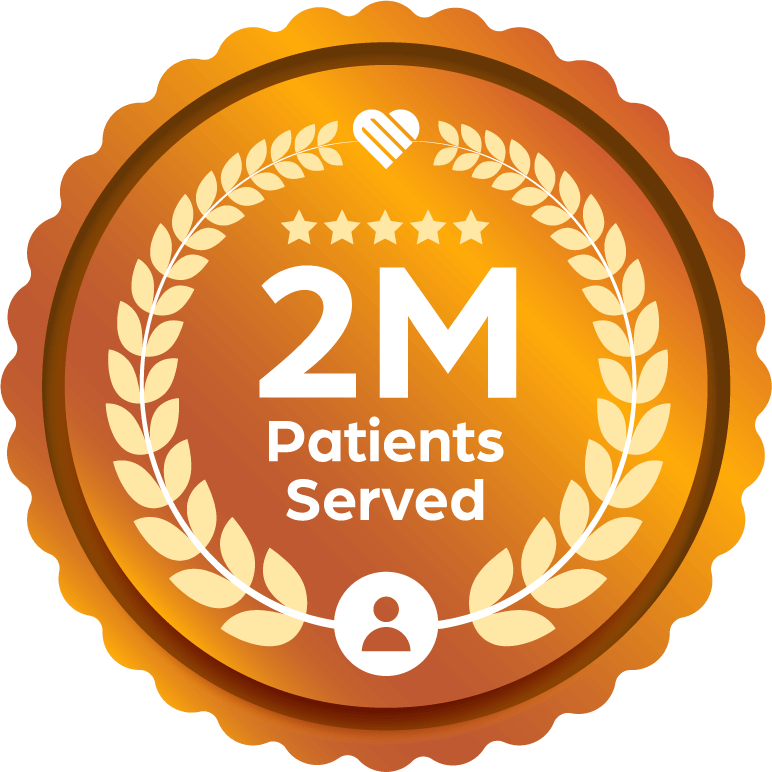

Get your New Hampshire medical marijuana card online in minutes.
Join our waitlist and receive a discount once NuggMD is available in New Hampshire!

Mike from CA
Approved for Chronic Pain
As seen on
How to Get a Medical Marijuana Card in New Hampshire
See Your Doctor
See a qualified medical marijuana doctor to get a written certification for cannabis use.
Submit Your Application
Submit your application, written certification, proof of NH residency, and the state's $50 application fee to the state's Department of Health & Human Services.
Get Your New Hampshire Med Card
If your application is accepted, you will be eligible to purchase medical cannabis in the state.

Get answers from one of our top doctors.
Making the right decision for your health starts with being informed. Get the answers you’re looking for from Dr. Niazi, or chat with our live support team if you want more answers.
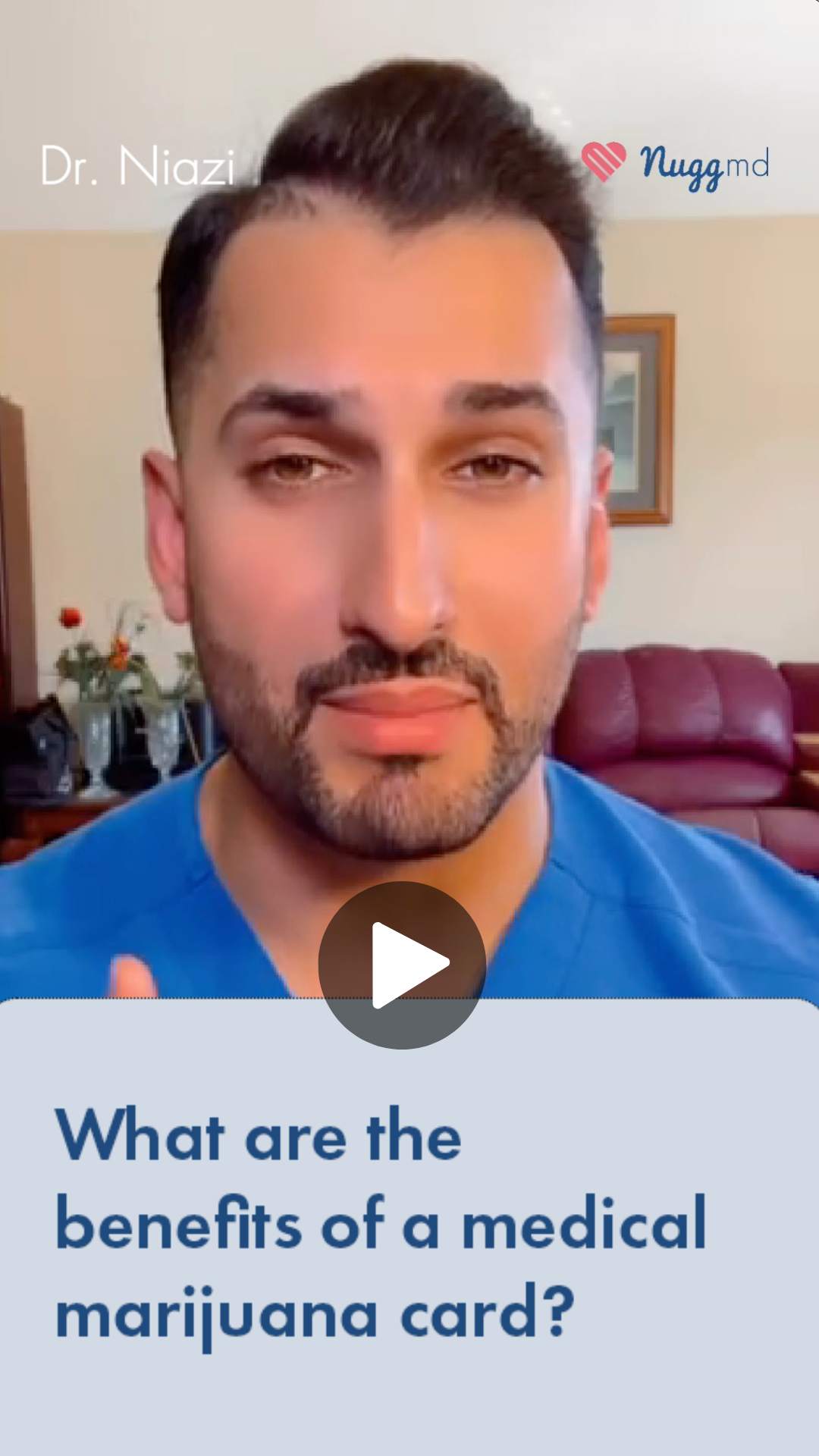
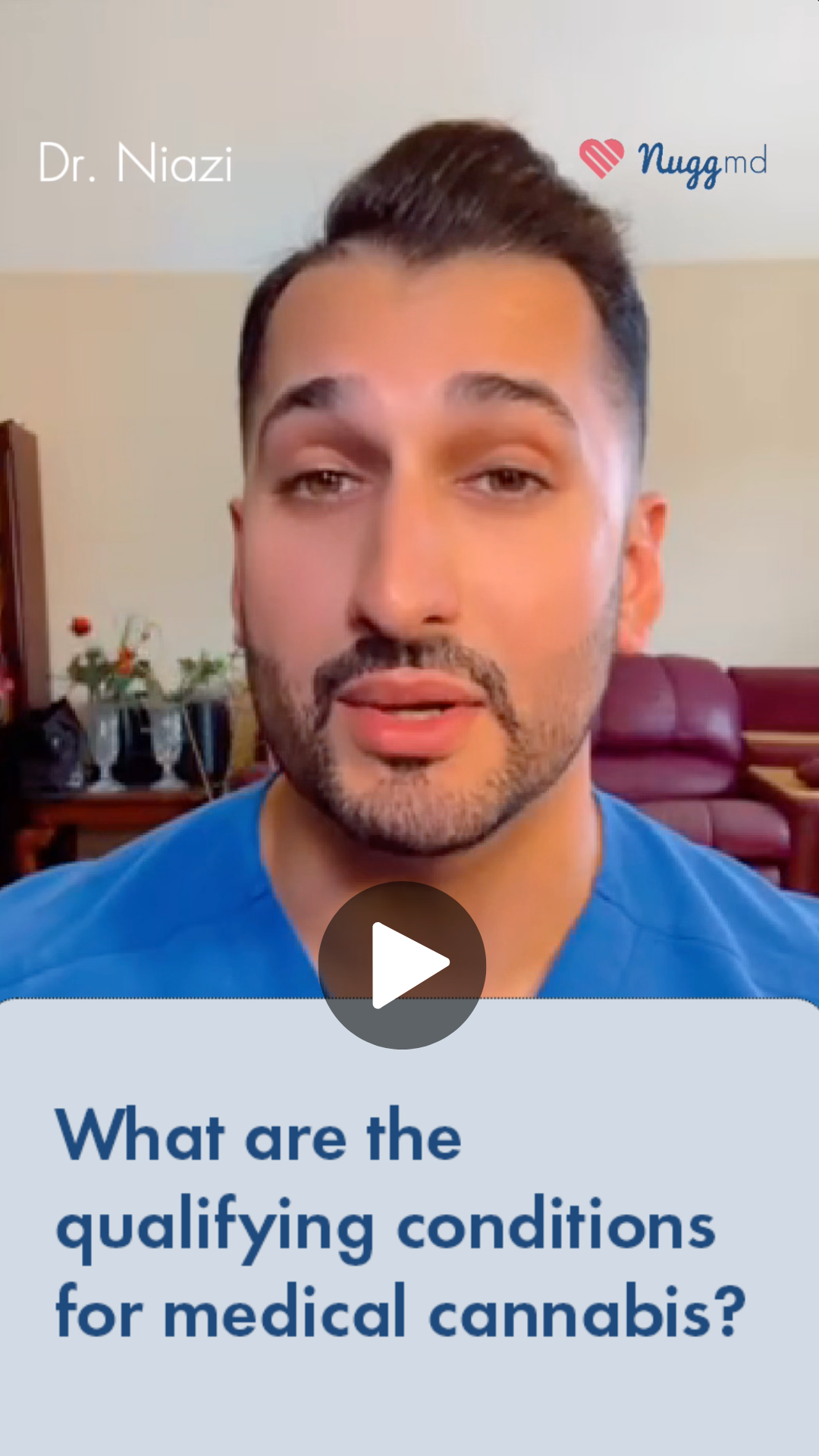
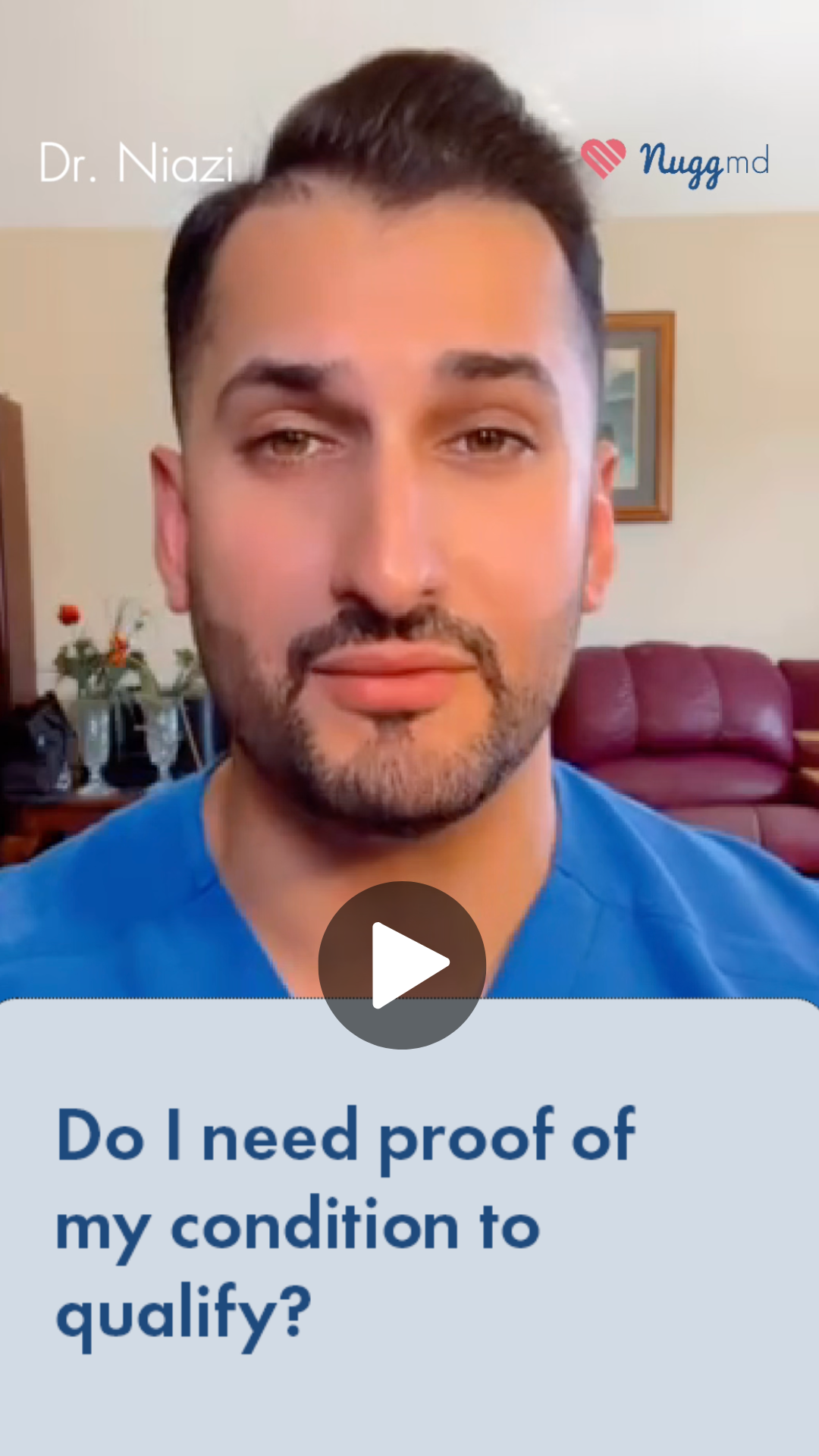
What are New Hampshire’s qualifying conditions?
Each state has their own set of “qualifying conditions” and most don’t need medical proof that you have it.
In New Hampshire, some conditions are automatic qualifiers for medical cannabis. Others need to be paired with a qualifying symptom.
These conditions qualify a patient for medical cannabis outright:
- Autism
- Moderate to severe PTSD
- Moderate to severe chronic pain
- Severe pain for which previous treatments were ineffective
These conditions need to be paired with a qualifying symptom:
- HIV/AIDS
- Alzheimer’s disease
- ALS
- Cancer
- Chronic pancreatitis
- Chron’s disease
- Ehlers-Danlos disease
- Epilepsy
- Glaucoma
- Hepatitis C
- Lupus
- MS
- Muscular dystrophy
- One or more injuries resulting in qualifying symptoms
- Parkinson’s disease
- Spinal cord injury
- Traumatic brain injury
- Ulcerative colitis
Qualifying symptoms include:
- Agitation of Alzheimer’s disease
- Cachexia
- Chemotherapy-induced anorexia
- Constant or severe nausea
- Elevated intraocular pressure
- Moderate to severe insomnia
- Moderate to severe vomiting
- Seizures
- Severe pain which as not responded to other treatments
- Severe, persistent muscle spasms
- Wasting syndrome
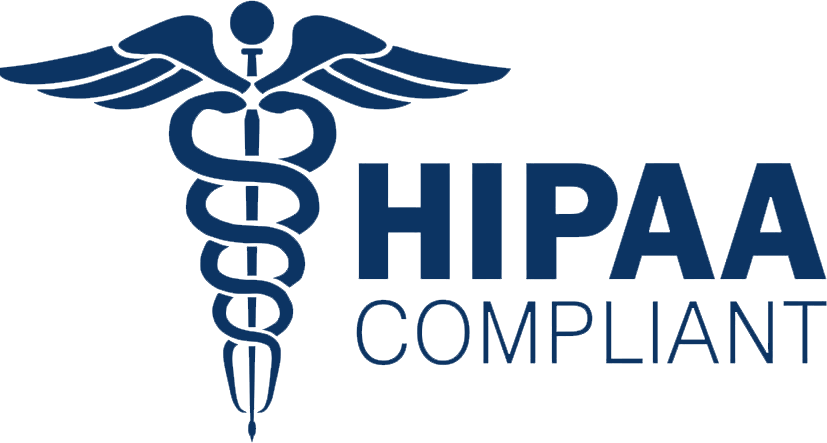
Meet your New Hampshire med card perks.
Your New Hampshire med card unlocks access to legal medical cannabis, legal protections, and guidance + support filing in your state.


Access safe, tested medicine
Purchasing legal medical cannabis from an NH dispensary ensures you’re using safe, tested product.

Increased protections for patients
Med patients in New Hampshire receive employment, medical, and parental rights protections.

Legally purchase and possess cannabis
Having a medical card is the only way to legally purchase and possess cannabis in New Hampshire.

Proper medical guidance
Having a med card allows you to get your doctor’s help treating your condition with cannabis.

State filing guidance
We help you file your required approval with the state as the final step to getting access to medical cannabis.
What to expect after you’re approved.


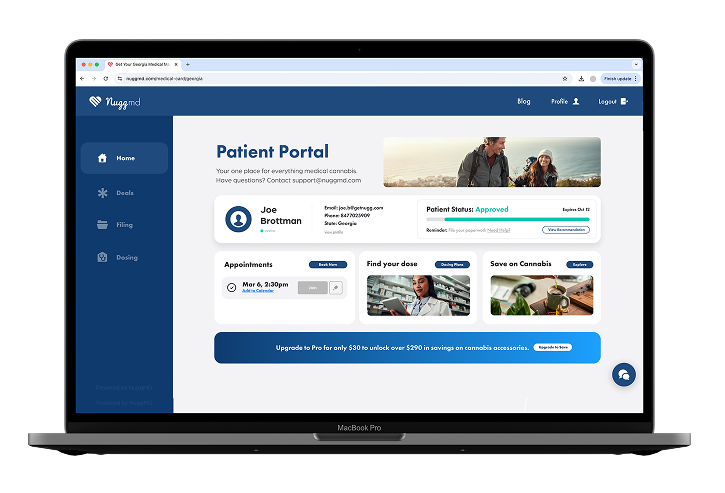

You’ll have full access to our patient portal, where you can view your rec, get state filing support, explore dosing plans, and more. At NuggMD, you’re getting more than a med card.


Why we’re the #1 provider in the nation.
Other Providers |
Offices |
||
|---|---|---|---|
Same day physician access |

|

|

|
Approved or your money back |

|

|
|
No appointment needed |

|
||
50+ in network docs |

|
||
100% online |

|
||
7-day live support |

|
||
State filing guidance |

|
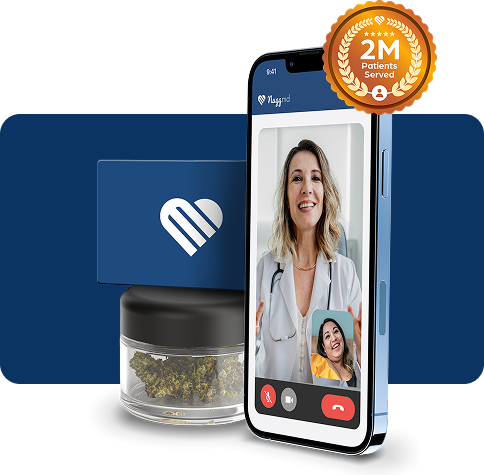
We’re on a mission to help you find relief through cannabis.
At NuggMD, our mission is to free people from their ailments with a personalized path to cannabis relief. We’re proud to be the leading medical card provider, and are continuing to pioneer new, patient-focused paths to relief.
Frequently asked. Frequently answered.
In order to qualify as a medical cannabis patient in New Hampshire, you must be a resident of the state. Adults 18 and over are eligible for the program on their own. Minor patients need to register with a parent or legal guardian as their caregiver. All patients must be diagnosed with one of the state’s qualifying medical conditions and certified by a physician for medical cannabis.
New Hampshire has a few conditions that will automatically qualify a patient for medical cannabis. For other conditions, the patient must have both the condition and a qualifying symptom. The full list of New Hampshire’s qualifying medical conditions and symptoms is as follows:
These are the conditions that qualify a patient for medical cannabis outright:
- Autism
- Moderate to severe PTSD
- Moderate to severe chronic pain
- Severe pain for which previous treatments were ineffective
These conditions need to be paired with a qualifying symptom:
- HIV/AIDS
- Alzheimer’s disease
- ALS
- Cancer
- Chronic pancreatitis
- Chron’s disease
- Ehlers-Danlos disease
- Epilepsy
- Glaucoma
- Hepatitis C
- Lupus
- MS
- Muscular dystrophy
- One or more injuries resulting in qualifying symptoms
- Parkinson’s disease
- Spinal cord injury
- Traumatic brain injury
- Ulcerative colitis
Pair one or more qualifying conditions with one or more qualifying symptoms:
- Agitation of Alzheimer’s disease
- Cachexia
- Chemotherapy-induced anorexia
- Constant or severe nausea
- Elevated intraocular pressure
- Moderate to severe insomnia
- Moderate to severe vomiting
- Seizures
- Severe pain which as not responded to other treatments
- Severe, persistent muscle spasms
- Wasting syndrome
New Hampshire’s list of qualifying conditions is maintained by the New Hampshire Department of Health and Human Services. It may be possible to petition the agency to add your condition to the state list. It also may be possible to seek the help of your state lawmakers to pass legislation amending the list.
Even though New Hampshire has decriminalized possession of ¾ ounce of cannabis, having a medical cannabis card is still the only way to legally purchase and possess cannabis in the state. Having a medical cannabis card will also allow you to:
- work out a treatment plan with your doctor that includes cannabis.
- appoint a caregiver to help purchase and administer your medicine.
- enjoy medical, parental, and employment protections that aren’t available to recreational consumers in the state.
NuggMD isn’t available in New Hampshire just yet, but when NuggMD’s service arrives, our prices will be among the most affordable in the state. As always, NuggMD’s evaluations are entirely risk-free because if your doctor doesn’t recommend medical cannabis, you’ll receive a full refund for your evaluation. Once you have your certification, you’ll still need to register with the state, which charges a $50 registration fee.
Unfortunately, cannabis remains illegal at the federal level, even for medical purposes. Because of this, nearly all insurance companies refuse to cover the cost of medical cannabis.
NuggMD does currently not offer its services in New Hampshire. Once you submit the state’s application and payment, if approved, you’ll have your certification that day. However, it can take up to 3 weeks for you to receive your New Hampshire medical cannabis ID in the mail.
With NuggMD, if you’re not approved get your money back, automatically. We believe everyone deserves access to a qualified medical cannabis doctor, and the cost of an evaluation shouldn’t be a barrier.
If you’re not approved for your medical marijuana certification, your evaluation is free.
If you sign up and pay for your evaluation, but then cancel before your evaluation, there is a small $10 fee for the payment processing.
Once you’ve been approved and issued your certification, a refund for services will no longer be available. Please send an email to support@nuggmd.com with the subject line “Refund Request” and a brief description of your issue.
We want to make sure you’re 100% satisfied with your purchase being that you, the customer, are the most important thing to us! Once a refund has been initiated, please allow 3-5 business days for the funds to transfer back to the card you used for the transaction. If any issues arise, please feel free to reach back out for further assistance.
NuggMD is not available in New Hampshire yet. You can see any state-approved practitioner to assess your qualifying condition and discuss medical cannabis treatment.
This depends on the state to which you’re traveling. Each state has different rules regarding reciprocity, and some don’t allow it at all. Check with your destination state to learn more.
Yes. You can prove your New Hampshire residency with any government-issued ID, like a passport, military ID, or tribal ID. You can also use other documentation that has your name and current NH address, like a lease, medical bills, vehicle registration, bank statement, utility bills, tax bills, or mortgage statement.











